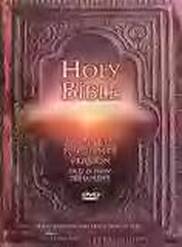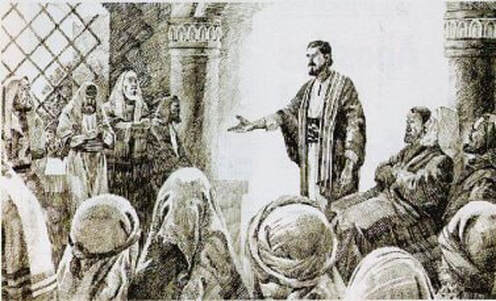Acts 15:1-21
Lesson 254
Read both the "King James Bible" and the "New Living Translation."
In this lesson:
Dissension in the church.
Do gentile converts need to be circumcised?
The Council of Jerusalem settles a dispute.
Christians are freed from Jewish legalism.
What do we do to be saved?
Peter addresses the Council of Jerusalem (15:7).
Artist unknown.
Artist unknown.
Who was -
James -
James was a common name in biblical times. In fact, counting two of Jesus' disciples, there are five James mentioned in the New Testament. This James was Jesus' half-brother (Mark 6:3; Galatians 1:19). He was not one of the original twelve disciples (Matthew 10:2-4). James converted after the crucifixion and became one of the "pillars" in the Jerusalem church (Acts 12:17; 21:18; Galatians 2:9). He eventually succeeded Peter as its leader. He is also the author of one of the earliest books in the New Testament, "The General Epistle of James," written between AD 40-49. James was nicknamed "camel knees" due to his heavy calluses from praying. Known for his conservative religious views, he was called "James the Just," and he had the honor of a private meeting with the resurrected Christ (1 Corinthians 15:7). In this passage,
James sided with Paul to end the Judaizers debate, which threatened to tear the young church apart (Acts 15:13-29; 21:18-24). Historian Flavius Josephus records that the Jewish high priest Ananus ben Ananus had James put to death in AD 62. James was dragged to the top of the Temple in Jerusalem and thrown off. He was severely injured but survived the fall. An angry mob then stoned him until a fuller (launderer) stepped out of the crowd and clubbed him to death with a pole used to beat dirty laundry.
Simeon -
Another name for Peter, who (along with his brother Andrew) was the first disciple (Matthew 4:18-20; Mark 1:16-18) and part of Jesus' inner circle. After the crucifixion, Peter became the "rock" on which Jesus built His church (Matthew 16:16-19), and he helped spread the Gospel from Jerusalem to Rome. Whenever the Bible lists the twelve disciples/apostles, Peter is always listed first (Mark 3:16-19), and Roman Catholics consider him their first pope.
James -
James was a common name in biblical times. In fact, counting two of Jesus' disciples, there are five James mentioned in the New Testament. This James was Jesus' half-brother (Mark 6:3; Galatians 1:19). He was not one of the original twelve disciples (Matthew 10:2-4). James converted after the crucifixion and became one of the "pillars" in the Jerusalem church (Acts 12:17; 21:18; Galatians 2:9). He eventually succeeded Peter as its leader. He is also the author of one of the earliest books in the New Testament, "The General Epistle of James," written between AD 40-49. James was nicknamed "camel knees" due to his heavy calluses from praying. Known for his conservative religious views, he was called "James the Just," and he had the honor of a private meeting with the resurrected Christ (1 Corinthians 15:7). In this passage,
James sided with Paul to end the Judaizers debate, which threatened to tear the young church apart (Acts 15:13-29; 21:18-24). Historian Flavius Josephus records that the Jewish high priest Ananus ben Ananus had James put to death in AD 62. James was dragged to the top of the Temple in Jerusalem and thrown off. He was severely injured but survived the fall. An angry mob then stoned him until a fuller (launderer) stepped out of the crowd and clubbed him to death with a pole used to beat dirty laundry.
Simeon -
Another name for Peter, who (along with his brother Andrew) was the first disciple (Matthew 4:18-20; Mark 1:16-18) and part of Jesus' inner circle. After the crucifixion, Peter became the "rock" on which Jesus built His church (Matthew 16:16-19), and he helped spread the Gospel from Jerusalem to Rome. Whenever the Bible lists the twelve disciples/apostles, Peter is always listed first (Mark 3:16-19), and Roman Catholics consider him their first pope.
Study Tip:
Summarize the most important lesson of each passage.
Summarize the most important lesson of each passage.




